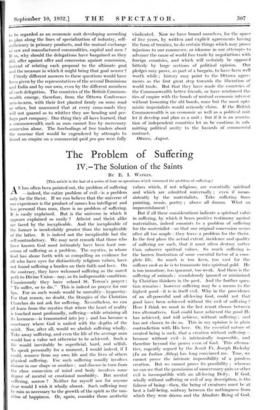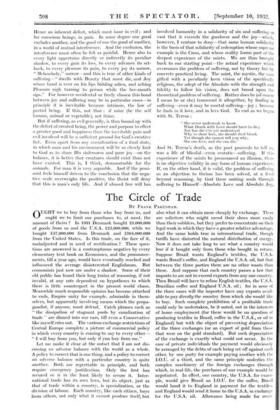The Problem of Sufferino.
IV.—The Solution of the Saints
BY E. I. WATKIN.
[This article is the last of a series of four on questions which surround the problem of suffering.'
jiS has often been pointed out, the problem of suffering —indeed, the entire problem of evil—is a problem only for the theist. If we can believe that the universe of our experience is the product of causes less intelligent and less personal than man, there is no problem of suffering. It is easily explained. But is the universe in which it appears explained so easily ? Atheist and theist alike are faced by the inexplicable. And the inexplicable of the former is incalculably greater than the inexplicable of the latter. It is indeed not the inexplicable but the self-contradictory. We may next remark that those who have known God most intimately have been least con- scious of suffering as a problem. The mystics, in whom God has shone forth with so compelling an evidence for all who have eyes for distinctively religious values, have not found suffering a burden on their faith and love. On the contrary, they have welcomed suffering as the surest path to Divine Union—nay, as its indispensable condition. Unanimously they have echoed St. Teresa's prayer : "To suffer, or to die." This is indeed no prayer for our lips. For us such words would be unreality—hypocrisy. For that reason, no doubt, the liturgies of the Christian Churches do not ask for suffering. Nevertheless, we can all learn from the mystics that where the heart of reality is touched most profoundly, suffering—while retaining all its keenness—is transmuted into joy ; and has become a sanctuary where God is united with the depths of the spirit. Nor, after all, would we abolish suffering wholly. Take away suffering, and even the life of the average man would lose a value not otherwise to be achieved. Such a life would inevitably be superficial, hard, and selfish. To speak personally for a moment, I would indeed, if I could, remove from my own life and the lives of others physical suffering. For such suffering usually involves disease in one shape or another ; and disease in turn from the close connexion of mind and body involves some degree of mental or emotional morbidity. But mental suffering, sorrow ? Neither for myself nor for anyone dear would I wish it wholly absent. Such suffering may be rain as necessary to the growth of the spirit as the sun- shine of happiness. Or, again, consider those aesthetic values which, if not religious, are essentially spiritual and which are admitted universally ; even if incon- sistently by the materialists. Take suffering from painting, music, poetry ; above all drama. What an impoverishment !
But if all these considerations indicate a spiritual value in suffering, by which it bears positive testimony against materialism, indeed amounts to a problem of suffering for the materialist—so that our original concession seems after all too ample—they leave a problem for the theist. In the first place the actual extent, incidence and quality of suffering are such, that it must often destroy rather than subserve spiritual values. • So much suffering is the barren frustration of some essential factor of a com- plete life. So much is too keen, too vast for the sufferer such as he is to transmute into spiritual gold. He is too immature, too ignorant, too weak. And there is the suffering of animals ; scandalously ignored or minimized by Christian thinkers in the past. And the further ques- tion remains : however suffering may be a means to the highest good—it is in itself evil. Why in the providence of an all-powerful and all-loving God, could not that good have been achieved without the evil of suffering ? Here I think we must in the last resort choose between two alternatives. God could have achieved the good He has achieved, and will achieve, without suffering ; and has not chosen to do so. This in my opinion is in plain contradiction with His love. Or, the essential nature of created being is such, that a creation without suffering— because without evil—is intrinsically impossible, and therefore beyond the power even of Cod. This alterna- tive, cogently argued by the Jesuit Fr. Joseph Rickaby (In an Indian Abbey) has long convinced me. True, we cannot prove the intrinsic impossibility of a painless creation. But we cannot prove its possibility ; whereas we can see that the permission of unnecessary pain or other evil is incompatible with an all-loving Deity. If God, wholly without suffering or evil of any description, is the fulness of being—then, the being of creatures must be at best a half-being, midway between the nothingness from which they were drawn and the Absolute Being of God. Hence an inherent defect, which must issue in evil ; and for conscious beings, in pain. In some degree one good excludes another, and the good of one the good of another, in a world of mutual interference. And the exclusion, the interference must often be felt as painful. Hence also to every light appertains directly or indirectly its peculiar shadow, to every gain its loss, to every advance its set- back, to every pleasure its pain, to every joy its sorrow. "Melancholy," sorrow—and this is true of other kinds of suffering—" dwells with Beauty that must die, and Joy whose hand is ever on his lips bidding adieu, and aching Pleasure nigh turning to poison while the bee-mouth sips." For however accidental or freely chosen this bond between joy and suffering may be in particular cases—in principle it is inevitable because intrinsic, the law of partial being. If this, not that : if mine (be the self human, animal or vegetable), not thine.
. But if suffering, as evil generally, is thus bound up with the defect of created being, the power and purpose to effect a greater good and happiness than the inevitable pain and evil involved will be a sufficient ground for God's creative fiat. Even apart from any consideration of a final state, in which man and his environment will be so closely knit to God as to share His sinlessness and pure joy—on the balance, it is better that creatures should exist than not have existed. This is, I think, demonstrable for the animals. For man it is very arguable. And if the pessi- mist feels himself driven to the conclusion that the nega- tive scale overweighs the positive, the -theist will deny that this is man's only life. And if abused free will has involved humanity in a solidarity of sin and suffering so vast that it exceeds the goodness and the joy—which, however, I venture to deny—that same human solidarity is the basis of that solidarity of redemption whose supreme example is the Cross, and whose reality forms part -of the deepest experience of the saints. We are thus brought back to our starting point—the actual experience which overcomes the problem of suffering, not by theory but by concrete practical living. The saint, the mystic, the man gifted with a peculiarly keen vision of the specifically religious, the adept of the Absolute with the strength and fidelity to follow his vision, does not brood upon the theoretical problem of suffering. . Rather does he (of course I mean he or she) transcend it altogether, by finding in suffering—even it may be mortal suffering--joy ; because he finds in it love, and in love God. To end as we began with St. Teresa :
"She never undertook to know - What Death with Love should have to do ; Nor has she e'er yet understood - Why to show love, she should shed blood. Yet though she cannot tell you why, She can love, and she can die."
And St. Teresa's death, as the poet proceeds to tell us., was a life of blissful—even 'ecstatic—suffering. If this experience of the saints be Pronounced an illusion, there is no objective validity in any form of human experience. If, on the other hand, it is valid, the problem of suffering as, an objection to theism has been solved, at a level beyond reasoning, by• God- there uniting souls through suffering to Himself—Absolute Love and Absolute Joy,































 Previous page
Previous page